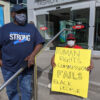
KJIPUKTUK (Halifax) – Earlier today we reported how Equity Watch calls for major structural changes to the Nova Scotia Human Rights Commission to deal with the many complaints about its fairness and timeliness that have been raised over the years.
The press conference and report launch was timed to roughly coincide with the third anniversary of the apologies issued to former firefighter Liane Tessier by the NSHRC and the Halifax Fire Service.
This is what Liane said at this morning’s press conference.
My case is symbolic of so many problems with the Nova Scotia Human Rights Commission and is a perfect example of what is wrong. It has become clear that the human rights regime is failing Nova Scotians in so many ways, and as a result, we have prepared this 50 page critique. This report reviews the behaviors of the commission as well as several key cases and issues in recent years. It then explores alternatives to the regime and most notably the current system in Ontario. And finally, we make recommendations for fundamental reform.
In 2007, I filed a complaint against my employer, the Halifax Regional Municipality, with the Nova Scotia Human Rights Commission because I was subjected to gender discrimination as a HRM firefighter. Five years later in 2012, the commission dismissed my case on what it called a lack of evidence after a shoddy and unfair investigation.
A long and unnecessary legal battle followed where the Commission failed to protect my worth as a woman and as a result I had to, out of frustration, continue my fight by filing for a judicial review and taking them to the Supreme Court of Nova Scotia in 2012. Two years later, in 2014, I won and Justice Arthur LeBlanc, with scathing words, remitted the matter back to the Commission, ordering a new investigation. You can read some of the judge’s comments in our report.
Some might argue that my case had a happy ending. We would argue the exact opposite, considering subsequent events. My story is all too common.
In December 2017, the Commission apologized that I had to go through such a lengthy process. I wish this was the only problem with the Commission. Getting complaints done in a timely manner is a huge issue, but only a small part of the problem and seems to be a recurring theme. Like many others who have spoken out in the past, we are speaking up today. I too was disillusioned by the Commission’s shoddy work ethic and cold as ice approach.
Overall, there’s been a complete lack of professionalism, including very poor communication with me throughout the five years. They did not contact the people that would have supported me. There were many gaps of time over the years where nothing was done on my file. There was evidence of biased lazy investigating. The commission took the employer’s side automatically at face value. Key people were not contacted. The Commission gave HRM extra time and extensions to get paperwork submitted, yet did not give me the same courtesy, and there was an apparent lack of knowledge or insight into systemic gender discrimination.
Finally, in 2017, 10 years later, my case was referred to a Board of iInquiry. My employer wanted to settle and agreed to the admission that HRM had engaged in systemic gender discrimination and apologized to me and other women affected by gender discrimination. All parties were to participate in a restorative meeting, (there was) a monetary settlement, and six promises, including education programs, workplace complaint policies, inclusion of members of designated groups on hiring panels, training for those panel members, a policy review and an annual update and collection of data on recruitment and hiring.
For the past three years, we have requested information on the progress on those promises. But neither the Fire Services nor the Human Rights Commission has responded. There are disturbing indications that things have not improved since my settlement.
I gave a list to the employer and the Commission of my male bullies and harassers and most were repeat offenders who had abused other women within the service. But to my knowledge none of the perpetrators has been disciplined. Indeed, most of them have been promoted.
Ironically, my victory has actually made it harder for complainants. The Commission mishandled my case so badly and the court chastised them that now when complainants go to judicial review the Commission’s lawyers use my case as a case against them, arguing, so to speak, that you’re not being treated as badly as Tessier was, so you have no case and go away!
In 2018 and 2019 one of the female firefighters complained about a lack of opportunity to access the career track and inappropriate and sexist remarks from colleagues and superiors.
And it’s not just women. In our report, we discuss the outrageous way Black firefighters have been treated. Their human rights case vindicated them but not completely resolved (the issues). A Black firefighter is suing the Fire Service for what he claims is a history of ridicule, and withholding of advancement opportunities because of his race.
When another woman, firefighter Kathy Symington, complained about discrimination similar to my own, the (earlier) HRM admission of systemic gender discrimination had no bearing or merit in her case.
One of the only bright spots I know about is the first ever promotion two years ago of a woman and an African Nova Scotian man to deputy chiefs.
In my experience I believe the Human Rights Commission was only concerned with protecting themselves. Back in 2012, the Commission’s lawyer at the time strongly urged me to withdraw my judicial review.
If I had not fought against the Commission and won my judicial review, forcing them to redo my case, none of this would have been revealed. And both the fire department and the Commission would have continued with business as usual, denying women’s rights and perpetrating the gender discrimination and culture of mysoginy that I and other women were up against.
The Commission has adopted a piecemeal, one off, reactive and passive approach to the furthering of human rights. Things have to change and change fundamentally.
Read a brief summary of the report recommendations here.
With a special thanks to our generous donors who make publication of the Nova Scotia Advocate possible.
Subscribe to the Nova Scotia Advocate weekly digest and never miss an article again. It’s free!




Thank you for fighting this battle Liane. I dealt with the Human Rights Commission back in the 1980s and it was horrible then. They have not gotten any better. The Human Rights Commission and the NS Department of Labour are there for only two reasons – to make the provincial government look as if they are doing something for their citizens (when they really are not) to pay fat paycheques to workers who are not doing their jobs. It has been going on for decades. Hopefully, when people like you take them to task for their lack of work, it might change.